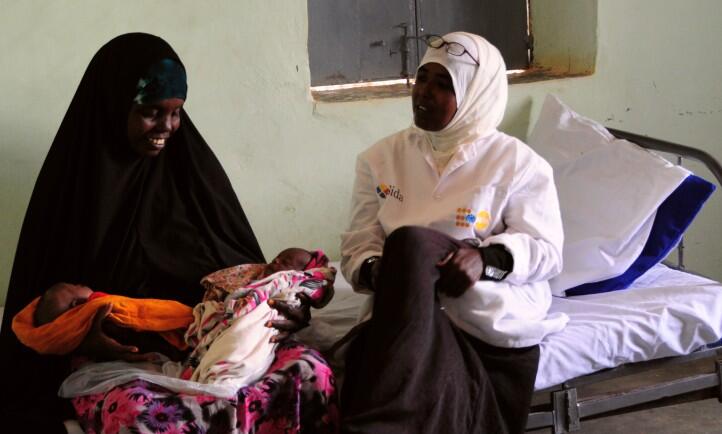MOGADISHU, 12 December 2020 – On International Universal Health Coverage Day, the Somali Government, in collaboration with the United Nations Children’s Fund (UNICEF), United Nations Population Fund (UNFPA), World Health Organization (WHO) and partners, renewed its commitment in accelerating efforts to provide universal health coverage (UHC) for all. They also urged other health and development partners to do the same.
“Close to 2.6 million of the most vulnerable Somalis are in need of health care,” said Dr Mamunur Malik, WHO Representative for Somalia. “By renewing our commitment to work closely together as agencies and with the Government, streamlining our efforts, and using innovative measures to provide health care and social security for all, we can ensure Somali households, particularly vulnerable populations, have access to life-saving health services. Somalia has already created a strong foundation of health personnel, some of whom deliver life-saving vaccines to children at household level, respond to health emergencies and support women of reproductive age among other work they do. We just need to support the country to build on existing systems and infrastructure -- but we must take bold actions together, and now, to build back better and stronger and advance universal health coverage.”
Universal health coverage ensures all people everywhere, no matter where they live, have equitable access to quality health services they need, without suffering financial hardship. It will strengthen health systems so that people can access vital health services even amid health emergencies, such as the ongoing COVID-19 pandemic, and will enable Somalis to access health services based on their needs, not on their ability to pay.
Investments made in training and supporting health care workers have also paid off: for example, the number of deliveries by skilled birth attendants has increased from 22% in 2010 to an estimated 29% in 2017, and around 650 000 children are receiving life-saving vaccines every year.
Additionally, findings from the Somali Health and Demographic Survey 2020 show a reduction in maternal mortality (from 732 to 692 deaths per 100,000 live births). However, they also show that the uptake of antenatal care and delivery at health facilities is still low. Only 24 percent of women made four or more visits to a health facility in their last pregnancy, and 21 percent delivered at a health facility. These two indicators are fundamental to the improvement of maternal health outcomes and to the success of the universal health coverage at large.
“While some progress has been made, still too many disadvantaged Somali women and children are dying every day, largely from preventable causes,” said Jesper Moller, Acting Representative, UNICEF Somalia. “Most of these deaths could have been avoided if vulnerable communities had access to basic health services. Therefore, we commend the Somali Government for prioritizing the most vulnerable in their efforts to achieve universal health care for all. Providing quality health care for children, especially during their first two years in life, will help them survive and thrive so they can reach their full potential.”
“Somalia is making strides towards ensuring that no woman or baby dies at birth, which is reflected in the reduced maternal mortality rate – that has been one of the worst worldwide. We will continue to work with the Federal Government of Somalia to ensure mothers feel safe while delivering their babies in Somalia,” said Anders Thomsen, UNFPA Somalia Representative.
The Somali Government has already taken concrete steps to roll out universal health coverage, in collaboration with UN agencies and health partners. This progress includes the development of a roadmap to advance universal health coverage, address health emergencies and promote healthier populations. Somalia is also in the process of revising an essential package of health services that meets Somalis’ most pressing health needs and that every Somali will have access to one day
For more information, contact:
Fouzia Bano, WHO Somalia, banof@who.int, +92 333 3352 749
Dheepa Pandian, UNICEF Somalia, dpandian@unicef.org, +252 613375885
Pilirani Semu-Banda, UNFPA Somalia, semu-banda@unfpa.org, +254 734 500 43


